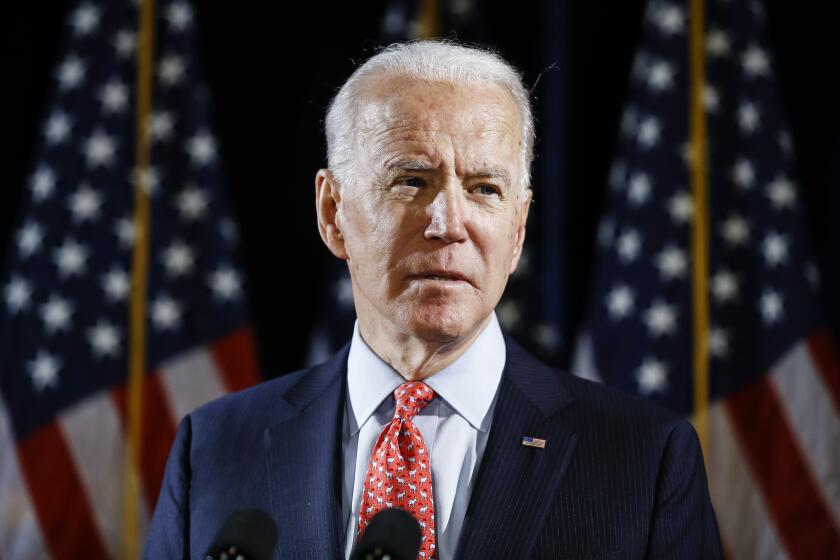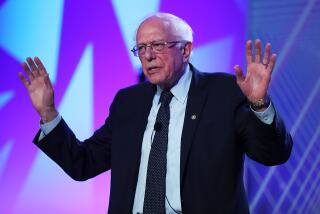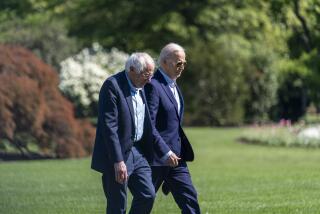
The Democratic presidential candidate was born in Brooklyn, N.Y., but moved to Vermont in 1968 at the age of 27 and spent eight years as mayor of Burlington in the 1980s.
- Share via
BURLINGTON, Vt. — Strolling with her son by the lake, she spotted the telltale crown of flyaway hair. Bernie Sanders was sitting at a table with business people, eating an ice cream cone.
Ashley Horton had to say something to the man she calls an inspiration. As a single mother and housekeeper struggling just to pay for food and rent, she felt Sanders gave her bearings in a political universe that seemed abstract and distant before. She knelt next to him and blurted out that she was a huge fan.
Sanders is accustomed to such adulation, and a fair share of grievances, in his adopted hometown, where he navigates without the usual important person’s buffers — no protective entourage or gated, guarded house, not even a hedge in his front yard.
No other presidential contenders have such long, symbiotic relationships with the cities where they live. Burlington shaped Sanders as Sanders shaped Burlington, so much so that it’s hard to consider one without the other.
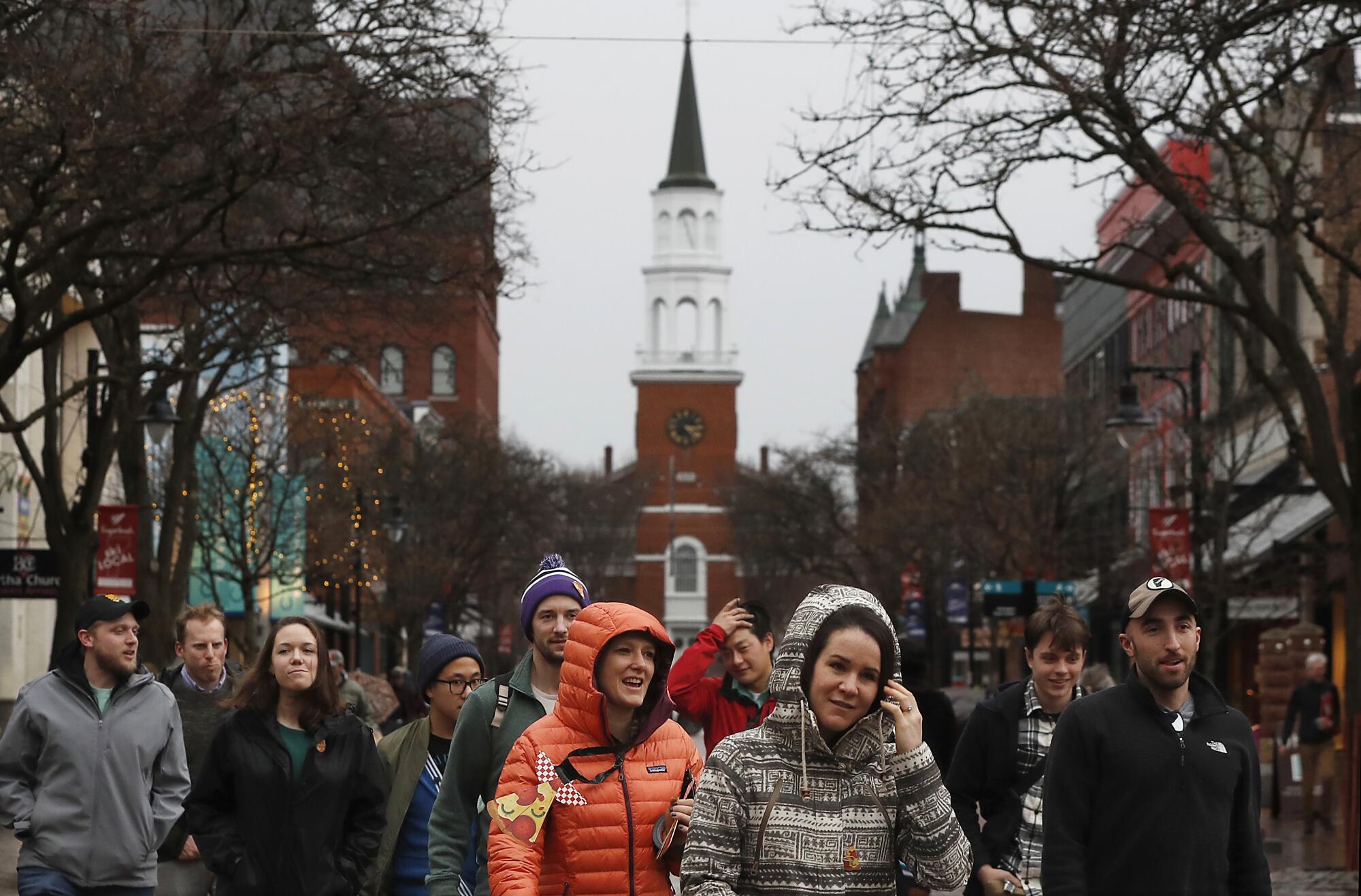
As he drives along North Avenue or College Street in his 10-year-old Chevy Aveo, he sees a city that reflects his worldview, where wealth is modest, public space is cherished, and residents are liberal, engaged and collectively powerful enough to counter big-money interests.
This small city that happens to be Vermont’s largest is far closer to Montreal than to any big city in the United States. Its low-rise blocks of old brick storefronts and clapboard homes can be walked end to end in an hour. With a skyline etched mostly by treetops and steeples, it could be mistaken for many a New England mill town but for a youthful energy and streak of quirkiness, sparked in no small part by the students of the University of Vermont. This municipality of about 43,000 has given the world the band Phish, Ben & Jerry’s ice cream and a fiery populist who happens to be one of the nation’s leading Democratic candidates for president.
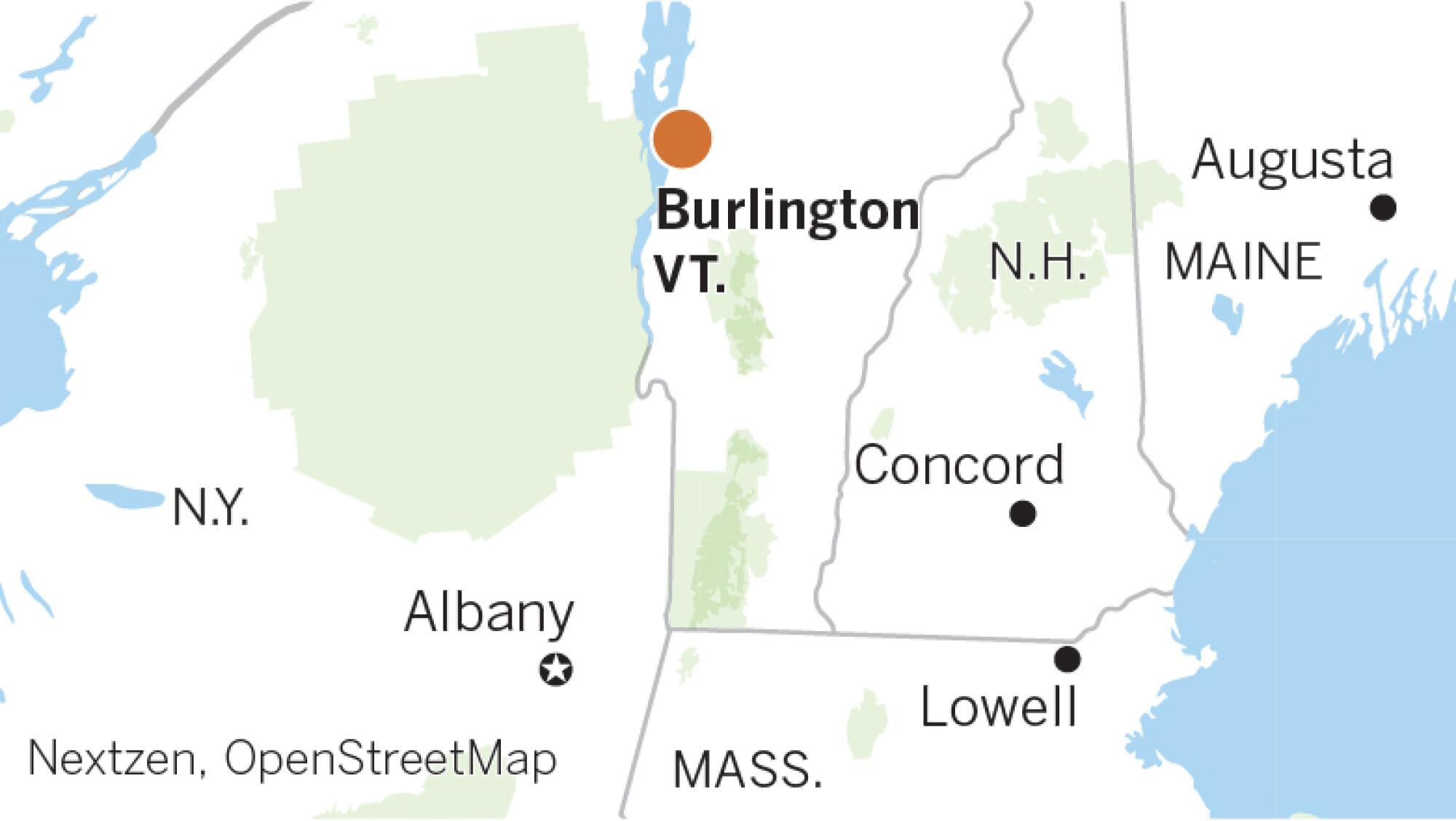
Here, Sanders, 78, is less the eminent statesman than the neighbor who talked your ear off for years about a rigged capitalist system — and somehow got world famous for his views. He’s the fervent yet frugal revolutionary you might spot one day at a rally for tenants’ rights and the next day at the Ace Hardware store looking for a flange nut.
In 2009, Sanders moved from the working-class South End near downtown to a four-bedroom, vinyl-sided colonial in a more detached, suburban part of the city called the New North End, a neighborhood carved from forest in the 1950s for ranch homes, cul-de-sacs and big backyards.
But he is still seen all over town.
When he shops at Hannaford supermarket near his house, or goes to coffee at the Penny Cluse Cafe on Cherry Street in the city center, he moves with purpose, head down, acknowledging all manner of greetings by throwing out one of his ungainly arms and a thick Brooklyn “hullo.”
His annoyance with glad-handing and small talk is legendary. Even his friends call him “abrasive” and concede he’d be the last candidate you’d want to have a beer with. Horton compares him to a “surly uncle you know has a soft spot.”
Which was why she was so moved that he not only stopped to listen to her, but got up from his table to watch her 4-year-old son, Calai, skateboard on the sidewalk. She feels he truly understands her predicament.
“I’m as small as it gets,” said Horton, 37. “I’m a woman, 100% single parent, below the poverty line. I always feel like he is speaking to me.”
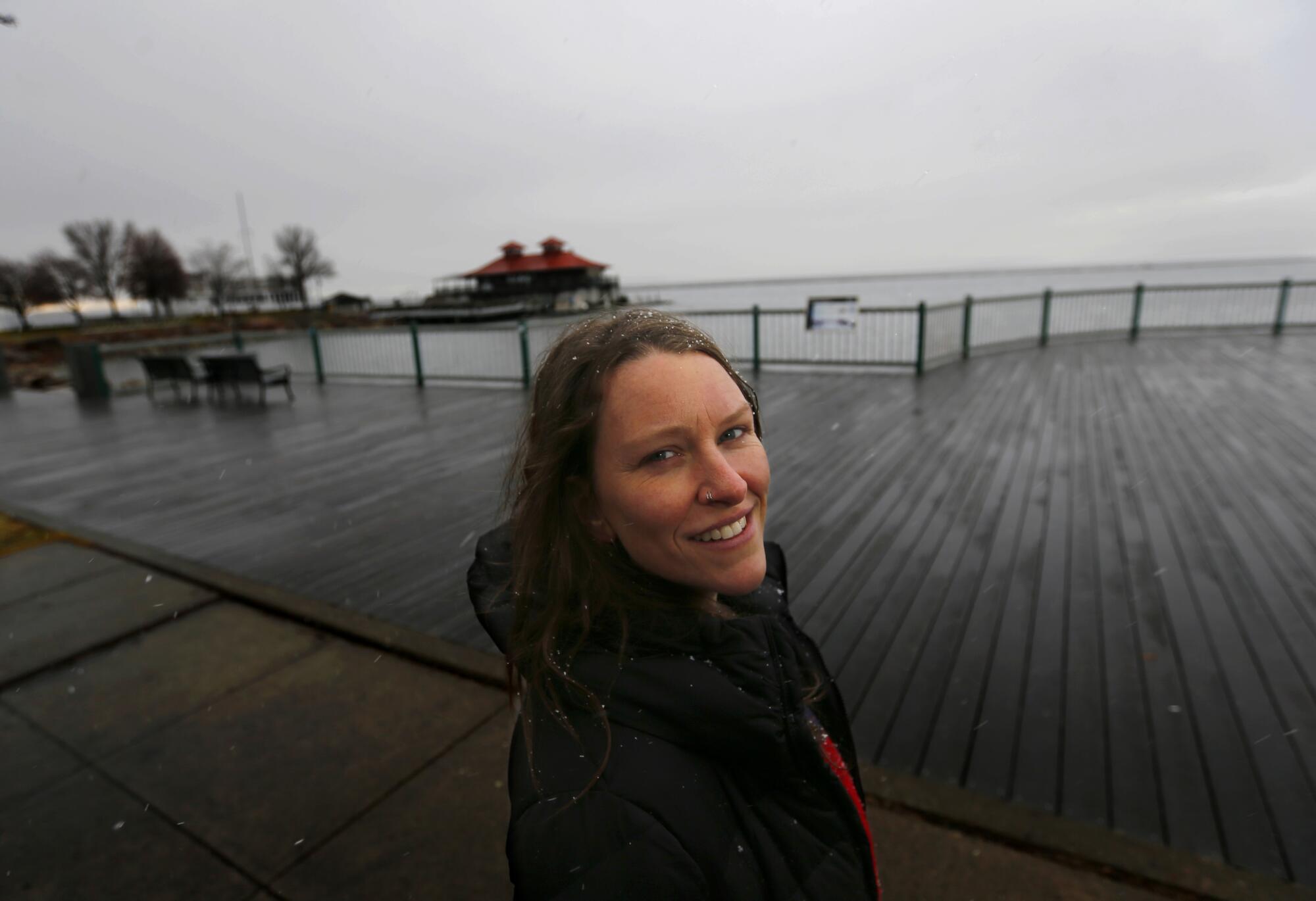
Everyone here seems to have a Sanders memory — and a Sanders impression.
“We talk about six degrees of separation,” said C.D. Mattison, a digital designer from Alaska who has lived in Burlington since 1989. “In Vermont, it’s one or two degrees. We see Bernie Sanders and Patrick Leahy and Peter Welch walking around town. They are ever-present and accessible. It’s wonderful.” (Leahy is the state’s senior senator and Welch is its sole congressman.)
Mattison has complicated feelings about Sanders, whom she supports for senator but not president. She says the fanatical following he cultivates has muffled political discourse in Burlington, to the point many Hillary Clinton supporters in 2016 felt they had to keep their views to themselves.
“There was an underground,” says Mattison, 54.
While she deeply appreciates how he ignited the progressive movement in Burlington and shepherded that message to the nation, she sees a blind spot that he never reconciled, perhaps because he is grounded in a city that is 83% white (down from 97% from when he was mayor).
“When I hear Bernie talk about race, gender bias and LGBTQ issues, it feels like he’s wagging his finger in my face and waving me off,” says Mattison, who is black and gay. “Bernie’s ‘revolution’ message is that economic justice is the cure and all the rest, everything that is personal to me, is noise.”
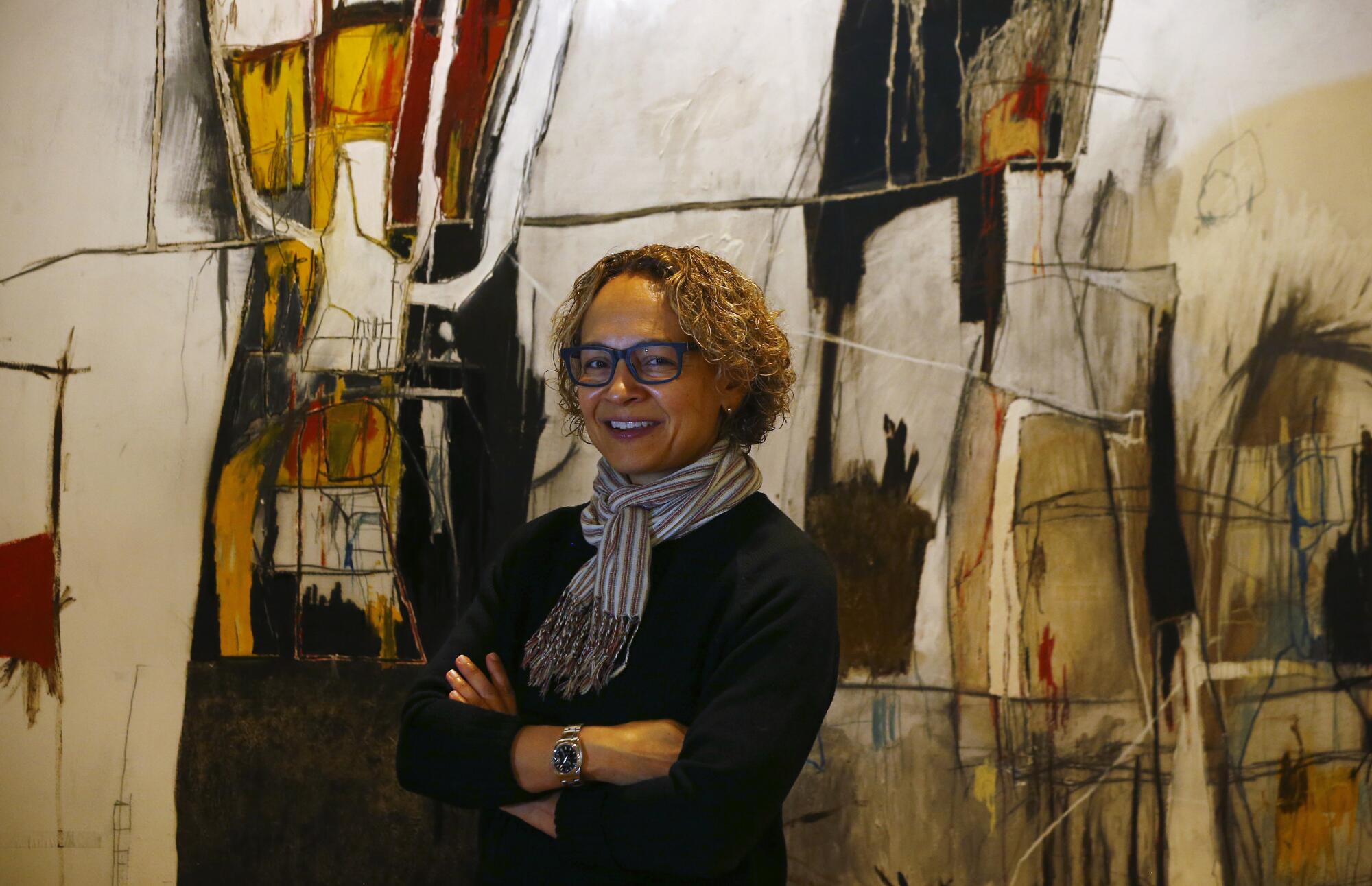
::
As mayor in the 1980s, Sanders blew up a stodgy Democratic political machine and ushered in a new era of progressive leadership.
In turn, Burlington gave Sanders a moonshot to the national stage, first as a left-wing counterpoint to the Reagan administration, then as an independent congressman and senator, and now, for the second time, as a leading White House contender.
He never had to alter his rhetoric or face losing his popularity here. Neither Burlington nor the rest of Vermont has the deep racial and social tensions that caused the electorate to toggle right or left as it did in larger, more diverse cities — no visceral fights over school segregation, busing, gangs, violent crime, police brutality and racial profiling. Sanders could stay the left course — and largely did — without major blowback. He was reelected to the Senate in 2018 with more than 89% of the vote in Burlington.
“You can take a speech he made in 1980 and recognize everything he is saying today,” says Terry Bouricius, a former City Council member and longtime Sanders ally. “Except the word ‘millionaire’ would be replaced by ‘billionaire’ now.”
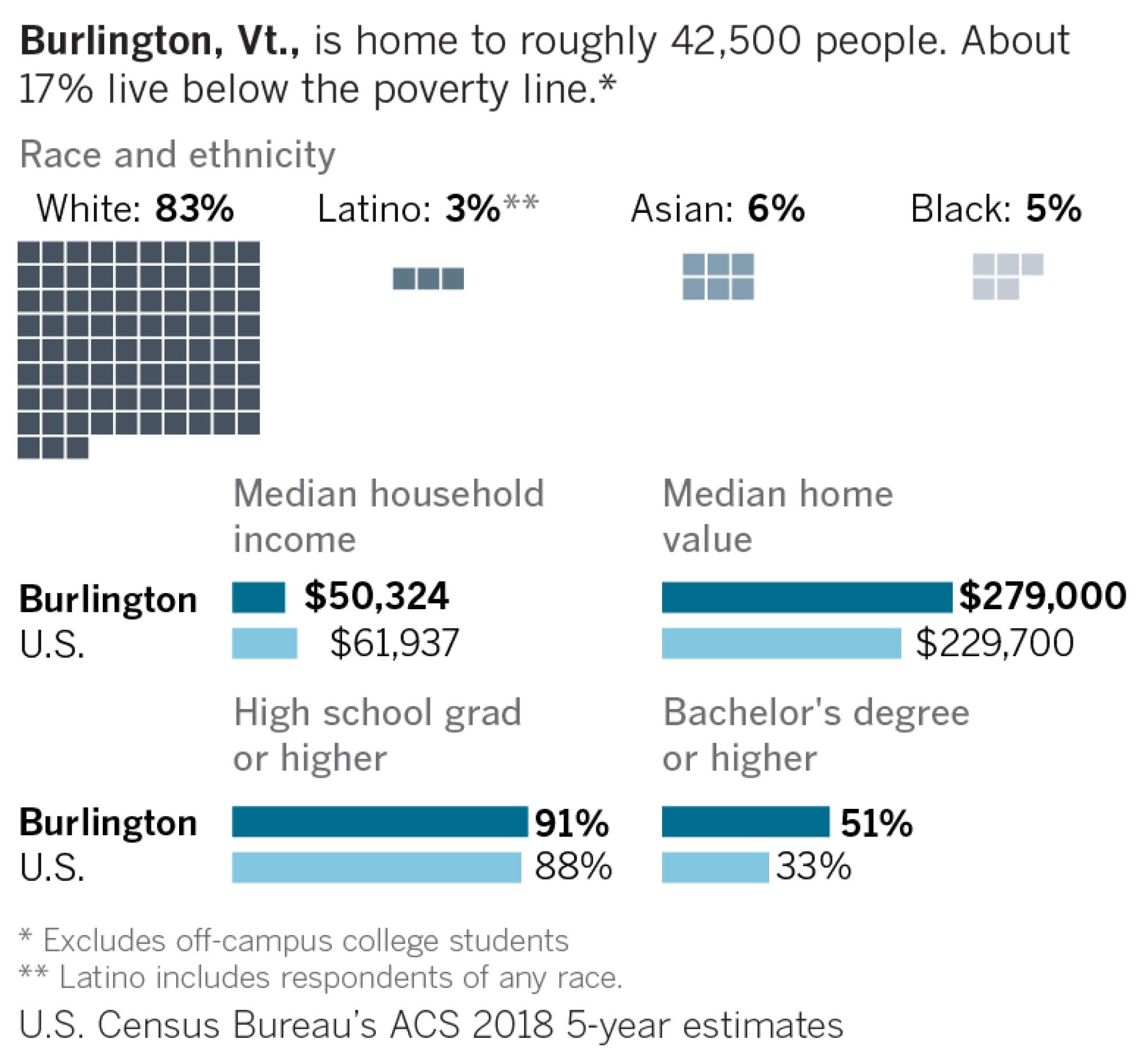
Born and raised in Brooklyn, N.Y., Sanders landed in Vermont full time in 1968 at age 27, swept up in a back-to-the-land movement of young urbanites swarming the Green Mountains to live in communes, collectives, farmhouses, school buses, tents and tepees. Sanders moved into an old sugar shack in the dirt-road community of Stannard, in the poor, isolated corner of the state known as the Northeast Kingdom.
In a mostly Republican-ruled state of only 400,000 people, these hundred thousand or so newcomers threatened to upend its politics. In 1972, Playboy magazine called Vermont the “dropout mecca of the Northeastern United States” and warned that the “the nation’s alienated young” could “stage a take-over” at the ballot.
What happened was more of a melding as the upstart “flatlanders” were forced to become more practical to survive rural life and harsh winters. After a year or two, many, including Sanders, left the rugged woods for civilization.
In Burlington, Sanders and other New York refugees turned their utopian visions into more practical efforts to improve cities for the poor and working class. Some started food cooperatives or tenant and welfare rights groups. Others launched progressive-minded nonprofits and businesses, such as the eco-friendly household products company Seventh Generation and an ice cream shop called Ben & Jerry’s in a shuttered gas station.
A former lumber port and mill town, Burlington has long been a shipping and rail hub, rising from a bluff along Lake Champlain to a hilltop where the University of Vermont was founded in 1791. It is a city lashed hard to nature. Surrounded by water, mountain and forest, it is buffeted by subarctic winds in winter, when snowdrifts and vast starry nights stir a sense of remoteness. In spring, residents burst from their dens, flocking to the beach and trails and bike paths, gathering for sunset in Battery Park. In summer, neighborhoods flutter with honey locust, silver linden, sugar maple, red oak, white ash and pignut hickory, all ready to ignite in fall with incendiary color.
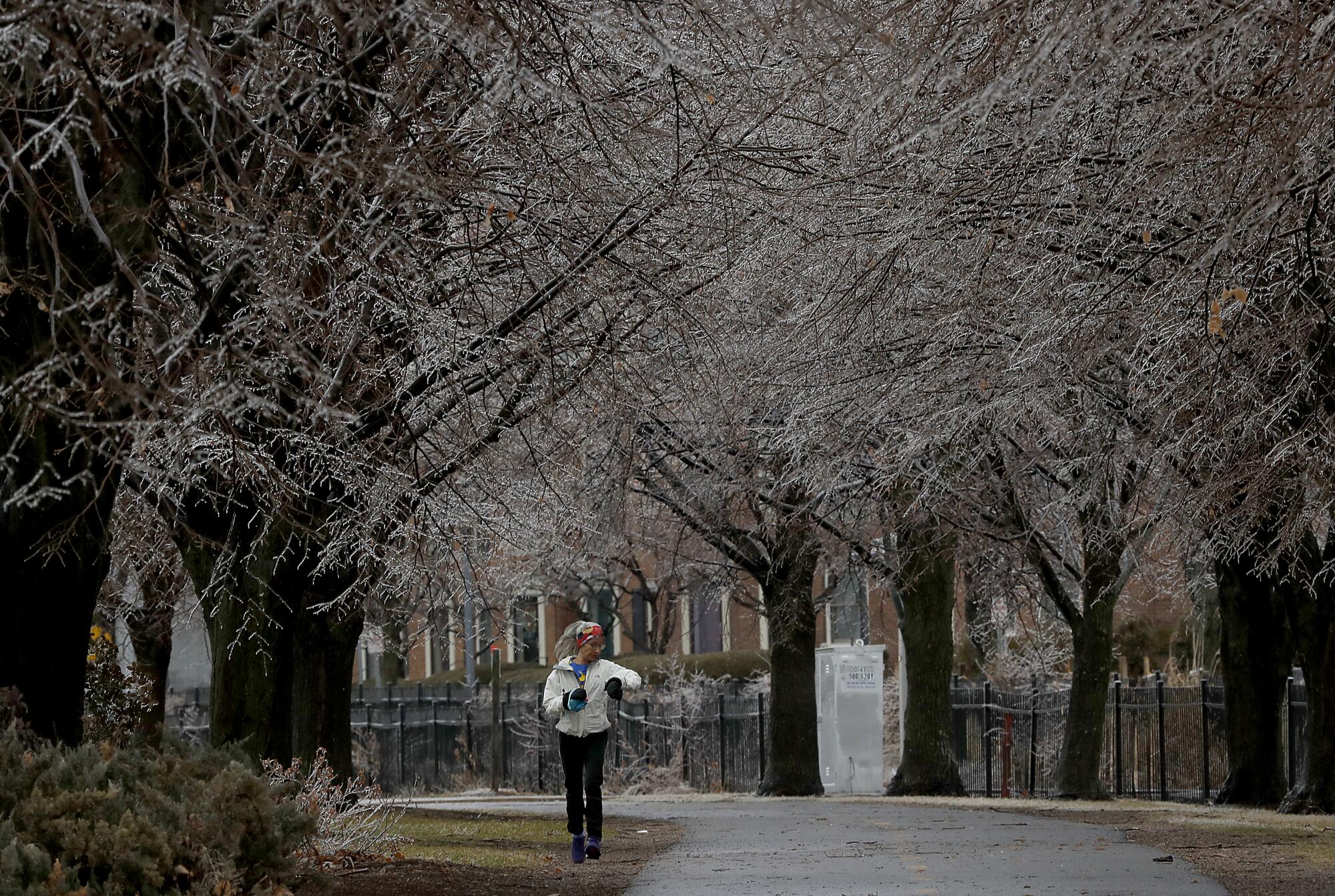
Burlington long drew working families from French Canada, Ireland, Italy, Germany and Lithuania. Many lived in the Old North End, a densely packed district of sagging cottages, small groceries and corner bars. They worked on the docks, at the rail yard, the Queen City Cotton Co., and later in manufacturing plants making IBM semiconductors, General Electric guns and missile systems, Burton Snowboards.
While there was no big racial divide, the economic one was clear. The lumber and textile barons, the corporate vice presidents and college deans, lived on the hill in big Greek and Colonial revival homes overlooking the city, the lake and the New York Adirondacks beyond. They sailed yachts in summer and rubbed shoulders at the men’s-only Ethan Allen Club downtown. The working class — including Sanders — lived below in rickety apartments and houses surrounding downtown.
About this series
Presidential candidates spend most of their time on the road, campaigning from one town to another. But what is the America they see from their own front doorstep? In this series of stories, Times reporters explore the communities that shaped some of the top Democratic candidates and their campaigns.
Sanders moved to a one-bedroom apartment in the Old North End. He produced history videos about New England he sold to schools, and wrote freelance articles. He had broken up with the mother of his young son, Levi, and was figuring out how to make a life for himself.
“He really had to struggle with poverty as an adult,” says Greg Guma, author of “The Peoples Republic: Vermont and the Sanders Revolution,” who has known Sanders for 48 years. “I lived across the street from him. He had trouble paying rent.”
But Sanders’ political ambition was as resolute as a sniper’s shot. As soon as he arrived in Burlington in 1971, he joined the state’s democratic socialist Liberty Union Party. He ran unsuccessfully on its ticket for Senate twice and governor twice within four years. In his final run for governor, he had his best result, winning 6.1% of the vote.
Despite the losses, he had found his life’s passion: campaigning.
Sanders left the Liberty Union party in 1978 and would not join another until last year, when Democratic National Committee rules required him to sign a loyalty pledge before he could make a second run at the party’s presidential nomination.
“He wanted to lead a movement and not be accountable to a central structure,” Guma said.
At the end of 1980, Sanders ran for mayor, and he and his volunteers knocked on doors all over the city. Having been immersed in big national issues like income inequality and tax reform, labor and civil rights and the peace movement, he had to adjust to the pot-hole politics of a small city.
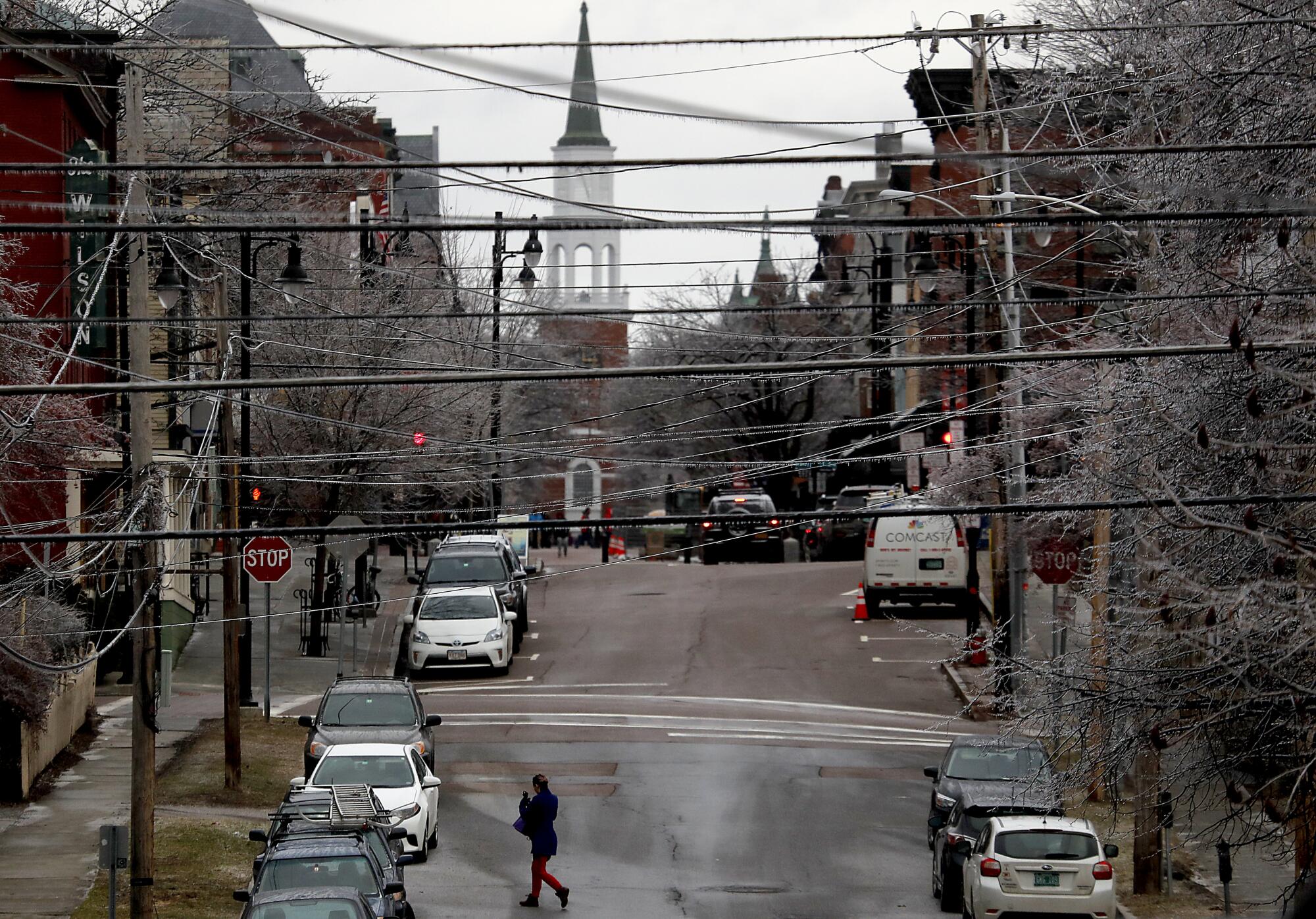
But he saw his worldview writ in the disparities between the hill and the flatter environs. He noticed how the streets on the hill were well-paved, while his were cracked and cratered, and how after a snowstorm the plows always hit the hill first. The working class might wallow in drifts for days. He listened to residents and small-business owners complain of a good ol’ boy network running the city with little input from ordinary citizens.
This tension all came to the surface in a massive project backed by the longtime Democratic mayor, Gordon Paquette. Developers wanted to turn the industrial wasteland that was the city’s lakefront — shuttered tank farms, mills, docks and rail yards — into a complex of upscale condos and hotels. The progressives in town, and many other residents, wanted that shoreline turned into a public space.
Sanders railed against the project with the slogan “Burlington is not for sale.”
On election day, to the shock of even his most ardent supporters, Sanders won by 10 votes.
When he parked his old beater in the mayor’s parking slot early on, he got a ticket, recalls his wife, Jane O’Meara Sanders. “The officer didn’t believe that could be the mayor’s car.”
His opponents, including 11 of the 13 city aldermen, decried his victory, saying he would destroy the economy. They stymied his every move, rejected every appointment he made, and even fired his secretary. He maneuvered around them by creating various mayor’s councils that turned into enduring city services when more fellow progressives swept onto the City Council in subsequent elections.
The city Sanders walks around today is shaped in many ways by the policies he set in motion as mayor, from the tree canopy to the string of parks and bike path along the waterfront.
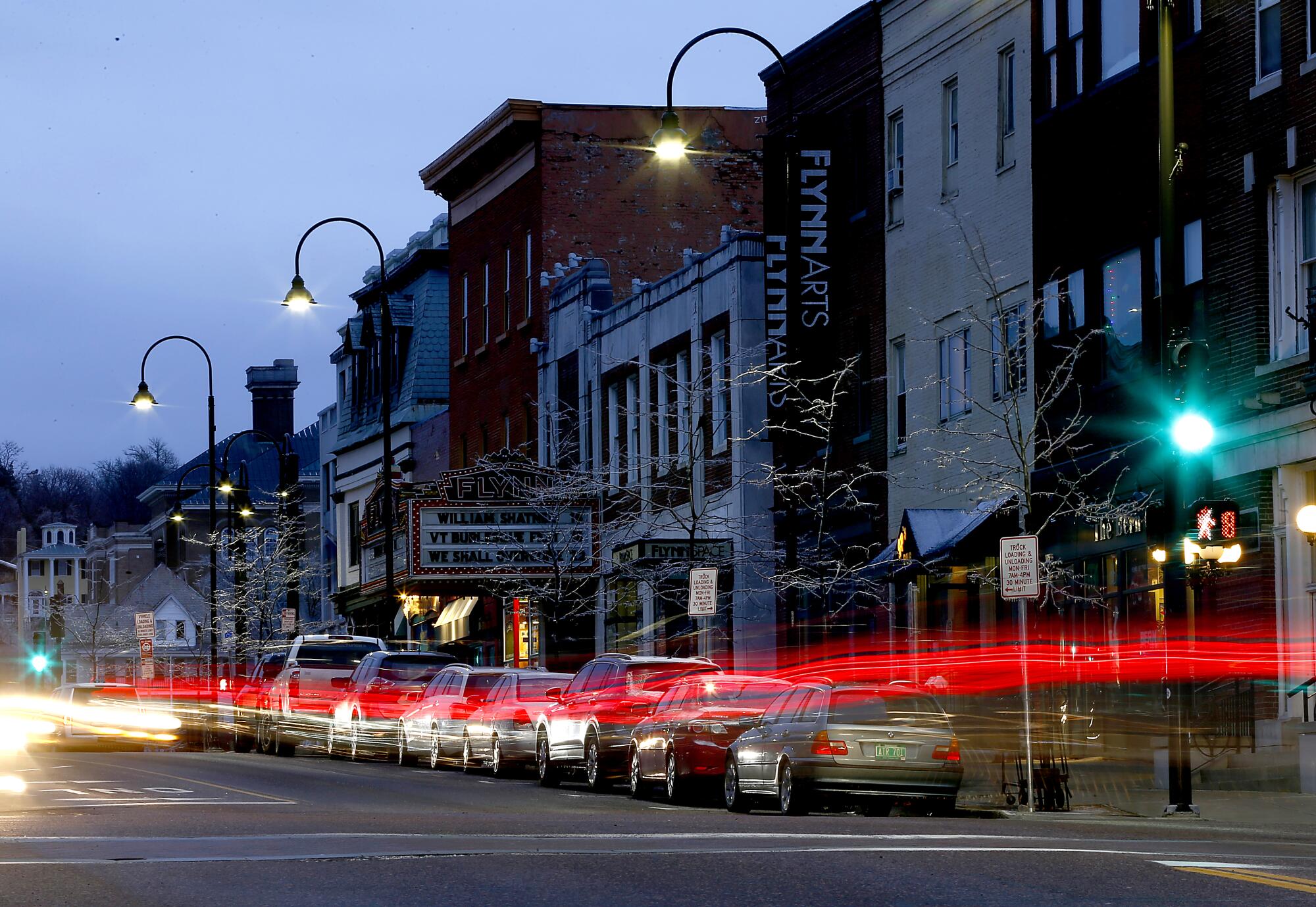
While his leftist rhetoric never stopped, his governance was more often practical, occasionally even conservative — rejecting a property tax hike, for instance, or putting the city’s insurance out for competitive bidding.
“He really paid attention to the nuts and bolts of the city government,” says Peter Clavelle, who served as Sanders’ chief of economic development and succeeded him as mayor for 15 years, carrying on his left-leaning agenda.
Sanders’ Arts Council spurred a thriving arts and music scene. His administration started a Little League in the Old North End, a volunteer network that planted thousands of trees, and an economic development agency that helped buoy small businesses with loans and lure employers like Burton Snowboards.
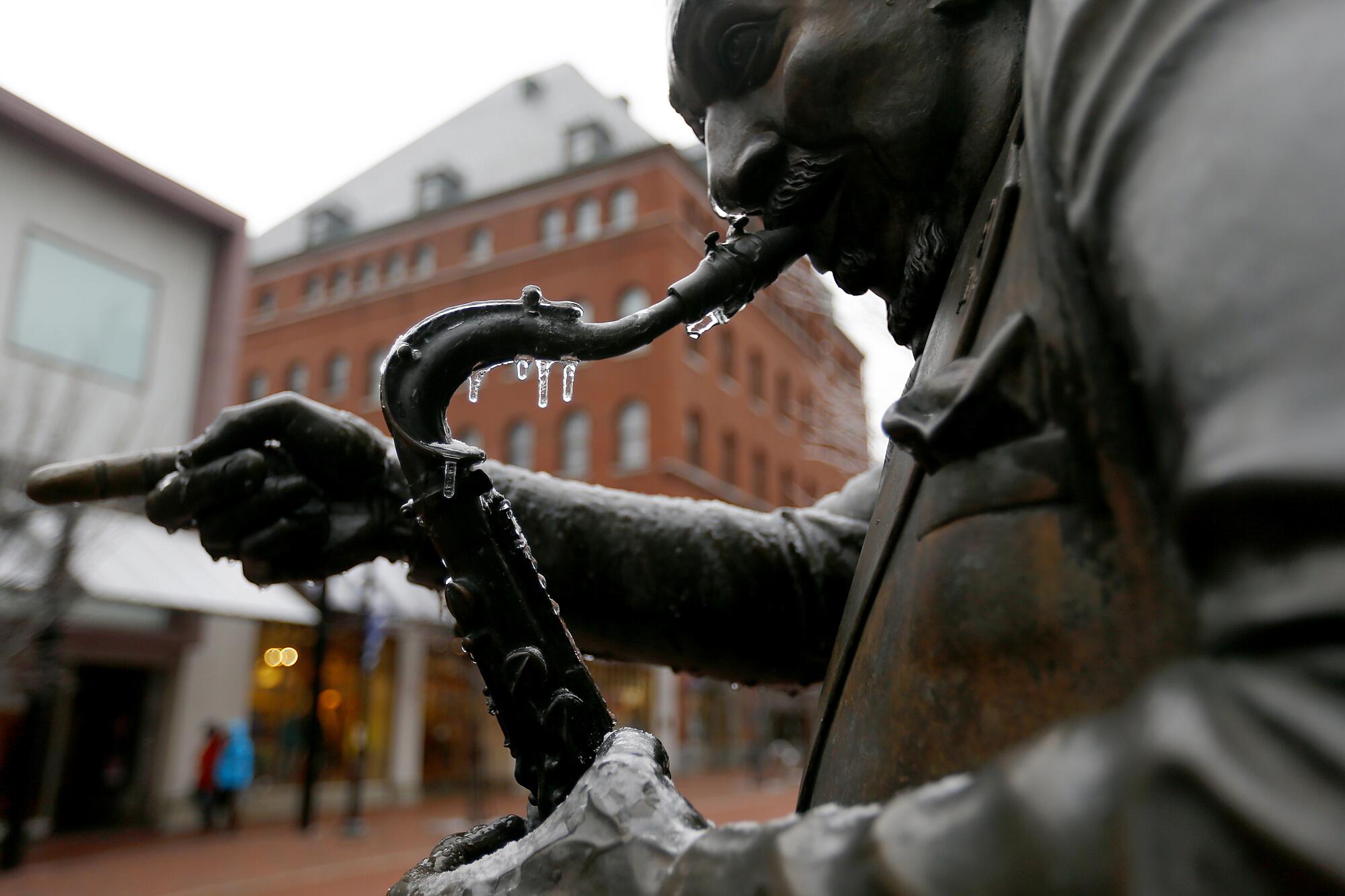
“Bernie is gung-ho about small business,” says Ben Cohen, the Ben of Ben & Jerry’s, which has launched two “Bernie” flavors in recent years, along with Phish Food. “He came in and had this attitude of, ‘What can the city government do to serve the city better?’”
Sanders did not conjure all of these ideas on his own. He listened to community leaders, formed neighborhood councils, hired technocrats he trusted and took their advice.
“One of the strengths that lasted, even to this day, is citizen engagement,” says Brenda Torpy, whom Sanders appointed housing director. “He’d tell us to go to the neighborhoods, go to the organizations and find out what they want and need.”
During his eight years as mayor, council meetings were packed and raucous, and voter turnout surged. In 1979, just over 7,000 people voted in the mayoral election. In 1987, over 12,000 did.
One of his main goals was to rein in real estate speculation and gentrification, to keep the tenants in their homes. In 1984, he established the Burlington Community Land Trust, which started buying and renovating rundown rental properties on the Old North End. The model was to rent them at fixed rates or sell them at low prices, while retaining ownership of the land and sharing in any value appreciation. Now called the Champlain Housing Trust, it is the largest such nonprofit in the nation and has 8% of the city’s housing units.
No nut or bolt was too small. “When the snow fell, he would be out with the plows riding with the driver,” Jane Sanders says.
While he brought free public concerts to Battery Park on the bluff, Sanders also went on a campaign to stop noisy late-night college parties, even accompanying police to dress down the revelers.
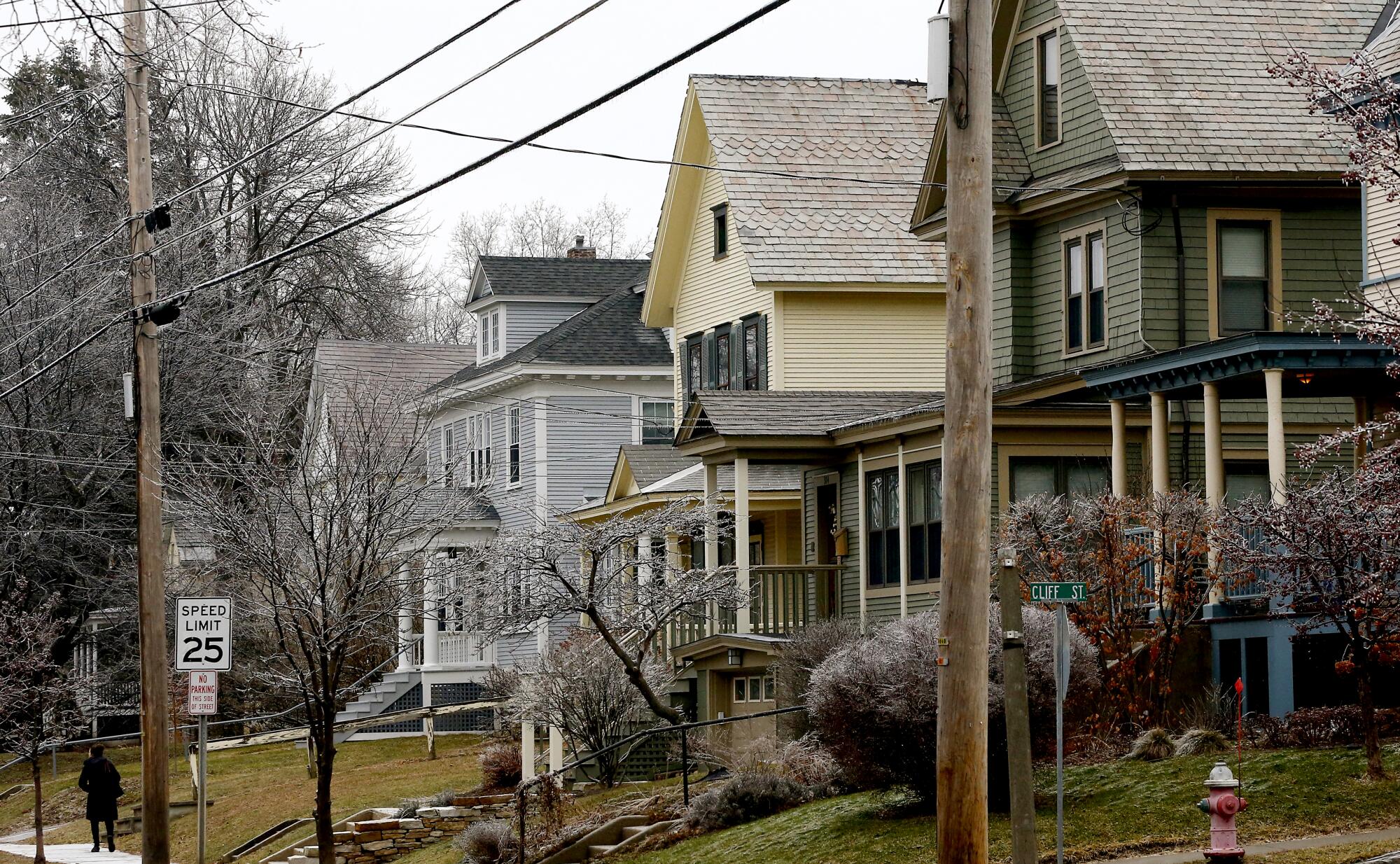
Sanders is credited by many for the success of the city, which regularly lands high on lists of the “most livable” towns in the country — a ranking that forces him to perpetually confront what he sees as a great evil: gentrification. Outside investors and vacation-home buyers see Burlington’s housing stock as a golden opportunity, to his dismay. Sanders has taken his fight for tenants and working-class homeowners to larger arenas.
After his eight years as mayor, he brought his sharp-edged persona to the House of Representatives, where he served as Vermont’s independent congressman from 1991 to 2007, before taking a seat in the Senate that year.
Stu McGowan, a longtime developer of affordable housing on the Old North End, climate change activist and the head umpire of the baseball league that Sanders started, says the senator’s cantankerousness is part of his charm in Vermont, where honesty, frugality and independence are exalted, and polish is seen as pretentiousness.
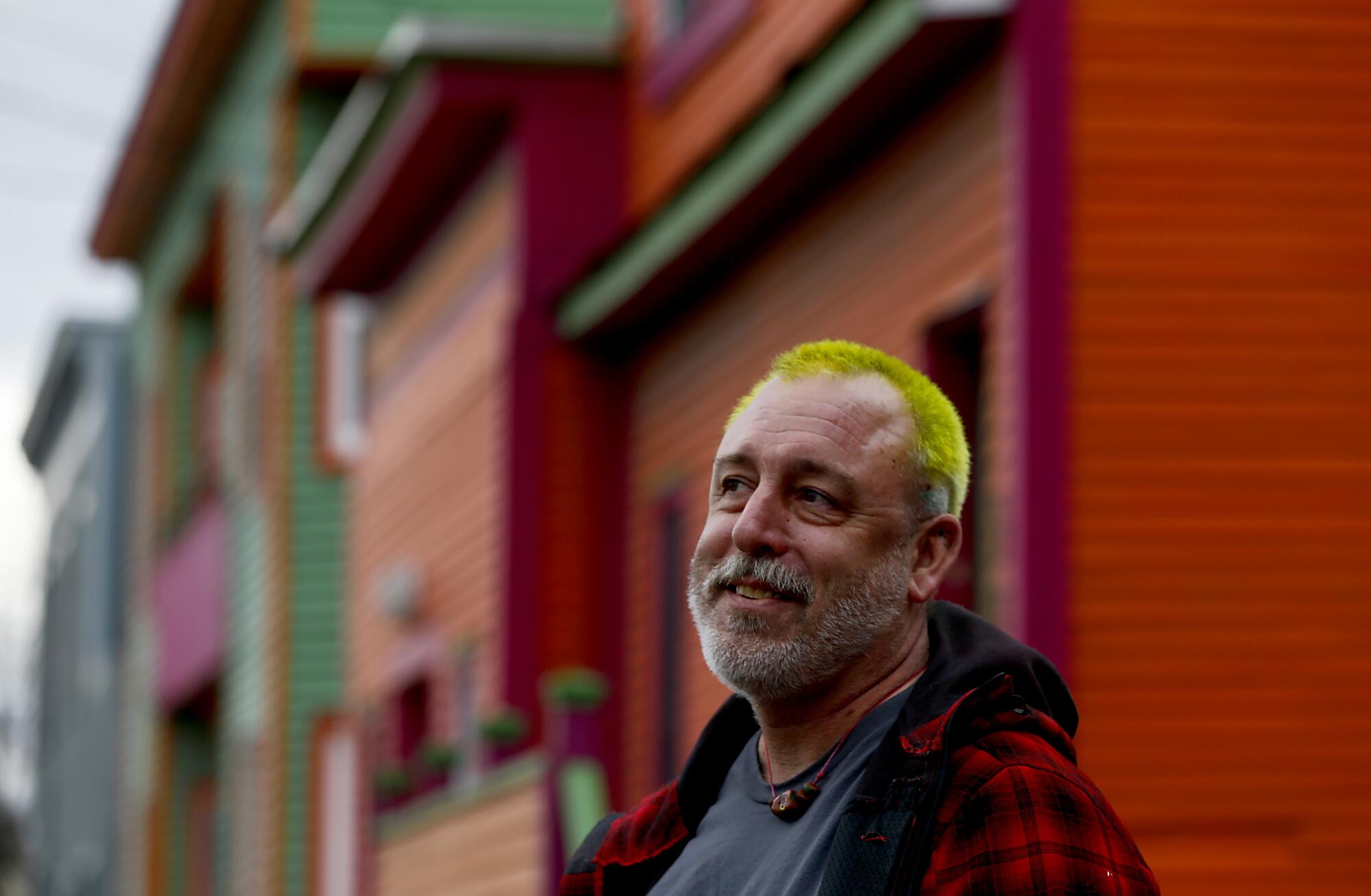
“You’d go to fundraising parties, and he’d just be sitting in the corner and you’d go to talk to him, and he’d do exactly what you see him doing now: He’d lecture you for three hours, and then he’d be like, ‘See ya.’”
McGowan, who is much more whimsical and dyes his hair a color called “electric banana,” says the Sanders the country has gotten to know in the last 10 years is the nicest version he’s seen.
“He’ll even take a selfie with you now.”
The field is down to Joe Biden now that Bernie Sanders ended his presidential campaign. Here is the Democrat heading for a battle with President Trump.
More to Read
Get the L.A. Times Politics newsletter
Deeply reported insights into legislation, politics and policy from Sacramento, Washington and beyond. In your inbox twice per week.
You may occasionally receive promotional content from the Los Angeles Times.
